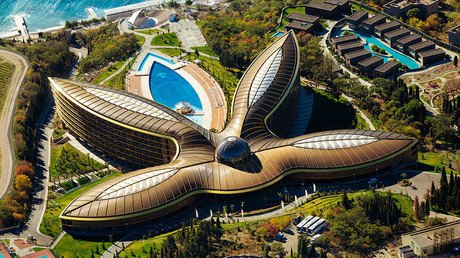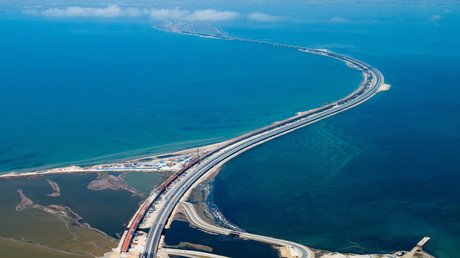Dreamhouse for free? These 5 destinations offer free homes, but there's a catch

Many places worldwide offer newcomers insanely cheap real estate or even cash in an effort to tackle problems like urbanization, bad demographic situations, or lack of workforce. However, they all come with strings attached.
1. Molise region, southern Italy
A region in southern Italy has recently announced it will pay newcomers €700 ($780) a month for three years if they move into one of its villages. The generous offer stems from the fact that people are gradually leaving the picturesque rural region, moving into megapolises like Milan and Rome.
What's the catch?
The money is good, but what do you have to do to earn it? Well, to start with, you have to move to Molise, obviously. And into a village that has fewer than 2,000 residents. You also need to set up a business there.
"We wanted people to invest here. They can open any sort of activity: a bread shop, a stationery shop, a restaurant, anything. It's a way to breathe life into our towns while also increasing the population," Donato Toma, the president of Molise, explained.
Also on rt.com Cities of angels? 5 metropolises that could soon be killed by Mother Nature2. Sicily, Italy
Molise is not the first Italian region with a generous offer for relocating – several towns in Sicily last year offered homes to anyone who's willing to come and claim them for €1 ($1.12) – less than the price of a standard espresso. The towns of Sambuca and Mussomeli announced sales of old properties in hopes of saving themselves from depopulation. Eventually, Sambuca sold off 16 historical stone mansions to buyers from the US, China, France, Britain, Russia, and Argentina. However, none of them actually went for €1 – the homes were sold in a blind auction in which bids started at that benchmark, but ended up between €1,000 and €25,000 ($1,100-27,600).
What's the catch?
The auction, obviously. Which did not stop the buyers! Also, the condition of the houses – all are beautiful but derelict old things on the verge of collapsing on the new owner's head. And – as a mandatory condition – the new owner has to spend at least €15,000 on renovating his or her Sicilian home, and to pay a security deposit of €5,000 in advance, non-refundable if the renovation is not carried out.
3. Kaitangata, New Zealand
In 2016, a number of media outlets posted news that the tiny New Zealand town of Kaitangata, with a population of just 800 and “too many jobs,” was offering $156,000 (€140,000) to each new resident. Local employers, which include a dairy plant, were also on board with the scheme.
Also on rt.com ‘Set your ovaries free’: Tanzanian president urges women to have babies to boost economyWhat's the catch?
It was actually the other way around. At the time, the town on the South Island had many empty houses, and offered them along with nice plots of land – for the bargain price stated in the articles. So, you would have had to pay the money, not get it from the town's authorities. Still, the mayor received around 5,000 calls from people planning to move and demanding money, and was forced to issue an official statement explaining what Kaitangata is actually able to offer and to whom.
“There is currently a story that has been published by overseas media that we are paying people $160,000 to move to Kaitangata and people should ring the mayor about it. This is NOT TRUE,” he stated, noting that if someone is “genuinely interested in the house and land packages in Kaitangata” and “meet the immigration criteria,” he or she is welcome to come, as the house price tags listed in the articles are correct.
Also on rt.com Japanese ‘facing extinction’ as humans turn to silicon sex dolls (VIDEO)4. Japan. 'Akiya banks'
'Akiya' is the Japanese term for 'vacant homes'. Akiya banks are websites that list vacant houses that are either for sale or given away for free. The sites started appearing in Japan, the world's third-largest economy, due to an ever-increasing number of abandoned homes both in the country's rural areas and in big cities like Tokyo. The problem stems from Japan's aging and shrinking population that has already left many towns and villages empty. The akiya sites are actually created by local governments and communities to manage the growing stock of empty houses in their towns, as well as to draw in people to live and work there.
What's the catch?
There seems to be none. Except for, maybe, the actual need for people to come and live in the house they buy. Also, some communities not only offer the newcomer a house for free, but are willing to pay for any renovations needed for the house to be habitable again.
Also on rt.com Mortgage debt in US exceeds 2008 financial crisis peak5. USA
A number of cities across the US have programs aimed at drawing in new blood and brains to their communities and enterprises. Last year, Tulsa, Oklahoma made headlines when it announced plans to start paying workers $10,000 to move to the state for a year in order “to attract tech talent and entrepreneurial people” and “diversify our workforce.” Prior to that, Vermont offered to pay 100 people up to $10,000 (€9,000) to move to the state in 2019. New Haven, Connecticut and Baltimore, Maryland both offered up to $80,000 (€72,000) in incentives to attract homeowners. The town of Harmony, Minnesota promised to give anyone up to $12,000 (€11,000) toward the cost of building a home – provided they live in it.
What's the catch?
Every state's offer is different, depending on what it is looking for – a worker or a homeowner – but mostly there's only one condition to be met – you have to move in, at least for some time. In some cases, bonuses are offered.
But Alaska has outdone them all. With the Alaska Permanent Fund, the state divides its oil royalties evenly among all registered residents and pays them out via an annual dividend, to anyone registered in Alaska – even children. Last year, it was $1,100 a person. Whether that's enough to make it worth trying to survive the Alaskan winters is another matter.
For more stories on economy & finance visit RT's business section














